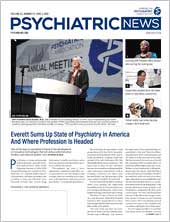At our institution, documentation is increasingly taking up to two-thirds of our time. … If you see six or seven patients in a row and then have to spend a couple of hours documenting your notes, that’s time you aren’t debriefing with an attending about your patients. ... I can spend 16 hours with an attending learning about patient care, and it doesn’t seem like 16 hours. But if I spend that same time by myself beating my head against a wall documenting notes, it’s a different experience. —A resident psychiatrist speaking at “Well-Being and Burnout Town Hall 2.0: Adapting and Thriving”
The comment above was representative of the testimony by psychiatrists—at every stage of their career—at a town hall meeting on well-being and burnout held last month at APA’s 2018 Annual Meeting in New York. Psychiatrists testified about the effect of electronic medical records, administrative burdens, maintenance-of-certification requirements, resident duty hours, and a range of other institutional and systemic factors affecting the work life of psychiatrists. Many also spoke about their own personal struggles with burnout or depression and how they found a path to resilience and rejuvenation.
The town hall began with brief remarks by Richard Summers, M.D., chair of the APA Work Group on Psychiatrist Well-Being and Burnout; APA President Anita Everett, M.D.; APA President-elect Altha Stewart, M.D.; and APA CEO and Medical Director Saul Levin, M.D., M.P.A.
Stewart told attendees that the work group will continue during her presidential year as a standing committee under the Council on Medical Education and Lifelong Learning.
Levin emphasized that burnout is largely a “systems” problem, requiring the attention of administrators at all levels. “This is not our problem alone to solve. We need to have CEOs of hospitals and health care systems involved.”
Their remarks were followed by nearly an hour’s worth of testimony by attendees. The most consistent observation—often from residents, but also from experienced psychiatrists—was about time spent in documentation that detracted from face-to-face patient care or consultation with supervisors and attending physicians.
Resident duty hours were also discussed. One trainee mentioned that certain activities designed to counter burnout can themselves become just another “task” on a long list of things to do. “We need to embed our solutions in the working day,” she said.
All spoke of a strong desire to connect with colleagues. “An overarching theme,” Summers said at the end of the meeting, “is the importance of relationships and community. It speaks to what draws people to psychiatry—a love of relationships and the need to connect.” ■
